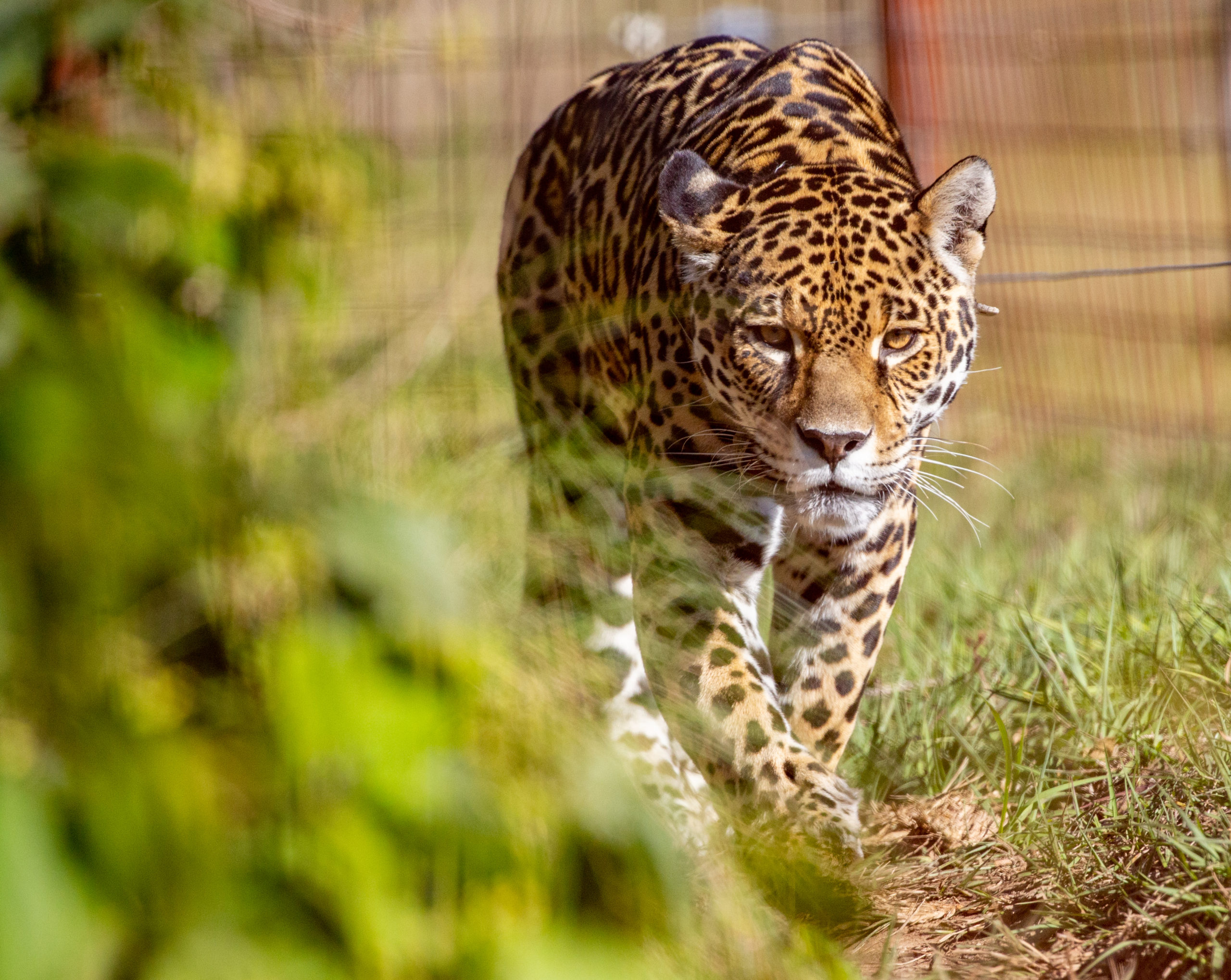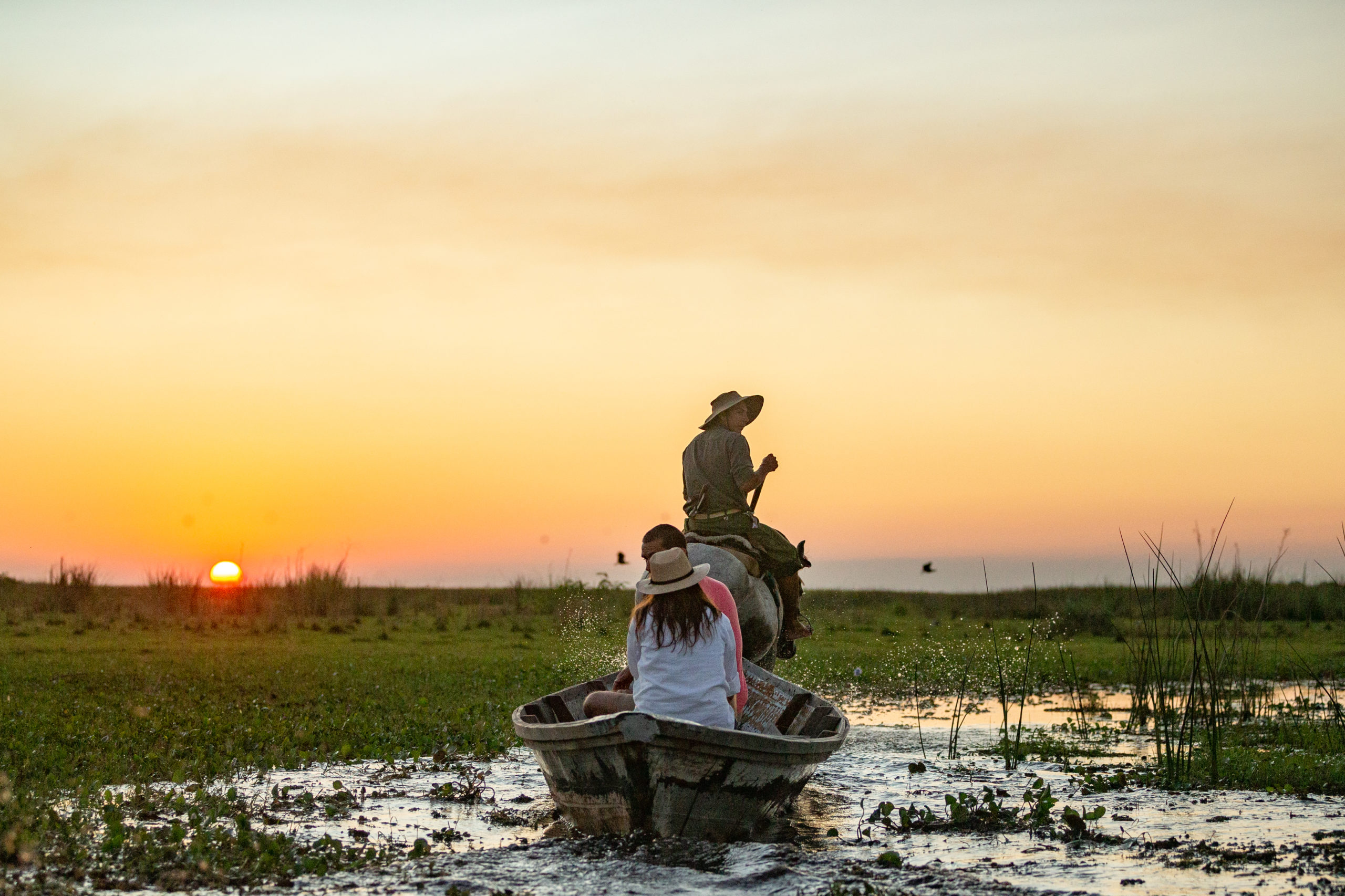Rewilding Argentina is reinvigorating native ecosystems and local economies by reintroducing locally extinct species into one of the country’s national parks.
Designated in 2018, Iberá National Park in the Corrientes province of Argentina is one of the newest national parks in the Americas and harbors the second largest wetland in the world. Among the sprawling, 1.7 million-acre expanse of marshland, vibrant red-and-green macaws soar overhead and giant otters splash and play in the rivers while giant anteaters, Pampas deer, capybaras, and majestic jaguars roam the grassland. After 70 years without them, these species have been reintroduced to their homeland.
It’s all thanks to the painstaking efforts of Rewilding Argentina, the offspring of Tompkins Conservation. The organization is fiscally sponsored by its partner Re:wild, a nonprofit that protects and restores the wild. Re:wild is also Avocado’s 1% For the Planet. For its part, Rewilding Argentina works to protect and restore natural ecosystems by reintroducing key species that have vanished due to human-related threats into their historical habitats in different parts of Argentina. It’s something the organization has done since 1997, when Tompkins Conservation purchased a key area of the Ibera wetlands and began reintroducing missing key species, starting with the giant anteater in Iberá in 2007.
Read more: What Is 1% For the Planet?
Now, the park teems with new life and biodiversity. The resurgence of native flora and fauna creates unique ecotourism opportunities for communities within the park and has revived their local economies. As a result, locals are now fervent stewards and protectors of the land.
But nearly two decades ago, Iberá was a far cry from the thriving ecosystem it is today. Due to hunting and soil degradation from cattle ranching and rice farming, many of the area’s nearly 4,000 species — about 30 percent of those endemic to Argentina — had gone extinct from the area.
To preserve the land and wildlife that remained, and to prevent further degradation, Fundación Rewilding Argentina (back then, part of Tompkins Conservation) began purchasing thousands of acres of the park in the late 1990s. The idea? To reintroduce keystone species — or species that are critical to an ecosystem’s survival — extinct from Iberá and make the park a destination for ethical ecotourism that would economically support local communities.
“We started with the giant anteater in 2007, because it’s a special and charismatic animal — everyone loves it,” says Marisi López, Parks and Communities Coordinator for the Iberá Project. “But in Corrientes, many people didn’t know about conservation or why bringing back those species was important. So we began talking to the communities around the park, trying to open their minds as to why we need to coexist with the animals and improve biodiversity. We told them about the health of the ecosystem and the health of humanity and how it can improve their welfare and their life.”
The giant anteater was just the beginning. After successfully reintroducing the native mammal into Iberá National Park — and a handful of giant anteater pups later — Rewilding Argentina knew they could continue the work with more keystone species. Over the subsequent years, the organization began projects to return the red-and-green macaw, the Pampas deer, the collared peccary, the bare-faced curassow, the ocelot, the giant otter, and the jaguar to the wetlands.

Read more: How Rewilding Redonda Island Saved Species From Extinction
“We are an example to other provinces. The red-and-green macaw was extinct in Argentina for more than 150 years,” says López. “If you go to the north part of Iberá as a tourist, you can see macaws flying in the skies. That’s incredible because Corrientes is the only province that has that in the whole country.”
Next, it was time to embark on their most difficult undertaking — reintroducing a locally endangered apex predator, the jaguar. The large cat species is culturally significant for communities like Corrientes. Artists weave it into their music, myths, and generational stories. But globally, 40 percent of the jaguar’s habitat has been destroyed by agricultural expansion and logging and the species is completely extinct in Uruguay and El Salvador. In Argentina, only around 200 jaguars remain.
In 2012, Rewilding Argentina began building massive, Jurassic Park-esque pens to help the previously captive jaguars adjust before reintroduction into the wild. The organization also worked alongside locals, the press, and the government to gain input and support. Finally, in 2015, they had their first female jaguar, Tobuna. Six years later, Rewilding Argentina had successfully released eight jaguars into the wetlands of Ibéra National Park.
“Corrientes is very proud — we have a party for every jaguar birth,” says López. “The kids paint their faces like jaguars, they create songs and flags for the republic of the jaguars, and the soccer team of the town is the jaguar. Everyone wants to be a jaguar in Corrientes.”

Read more: From Ridge to Reef: Rewilding the Galápagos
The return of the apex predator and other previously missing species isn’t just a triumph for the conservation and preservation of Iberá. These rewilding accomplishments created ecotourism jobs and reliable revenue for the people living in provinces like Corrientes. More than 50,500 tourists visited Iberá Park in 2021, the highest visitation number since its creation. In addition, more than 100 Iberá cooks and 200 Iberá artisans (two programs fostered by the government to resurge traditional recipes and craft-making) are thriving in the park’s nearby communities thanks to nature-based tourism and the export of their crafts. Hunters are now park rangers, cattle pull pontoon boats through the wetlands for nature tours, and young people who have left for other opportunities have returned home to work in the burgeoning economy.
“It’s a win-win. We win because we are conservationists and we want a thriving ecosystem and they win because they have a better income and they are proud of the land,” says López. “They have a better life in their own towns and they are happier.”
Ten provinces in and around the park benefit from the flourishing ecotourism economy. Locals operate eco-hotels, lodges, campsites, and restaurants. Others are part of the Rewilding Argentina team that monitors wildlife on the ground. And guides who have lived in Ibéra their whole lives lead tourists on explorations in hopes they too will learn to appreciate and preserve our planet’s extraordinary wildlands.
“Rewilding is a way to demonstrate that conservation efforts around the globe must take a step further,” says Nicolás Guastavino, Communications Coordinator for Rewilding Argentina. “It’s not just about conserving a space and leaving it as it is, but also restoring it and opening it to the public so people can get to know these places, fall in love with them, and also become guardians.”

Read more: The Baird’s Tapir Is Essential. This Man Is Saving Them.
Have feedback on our story? Email [email protected] to let us know what you think!

Shop Pillows
The Essential Organic Pillow Collection
Gentle, breathable, non-toxic support.





